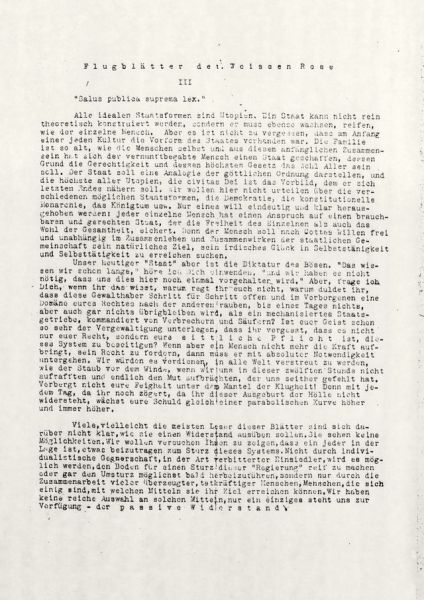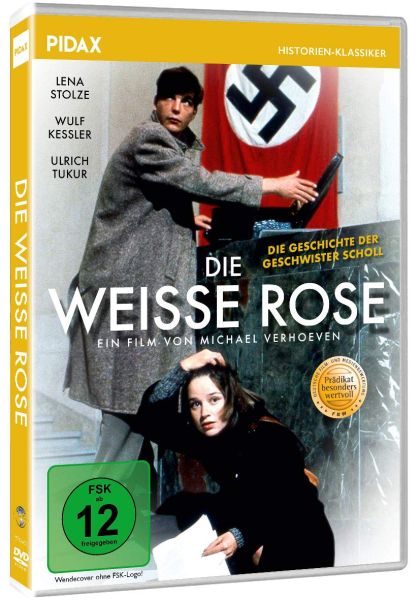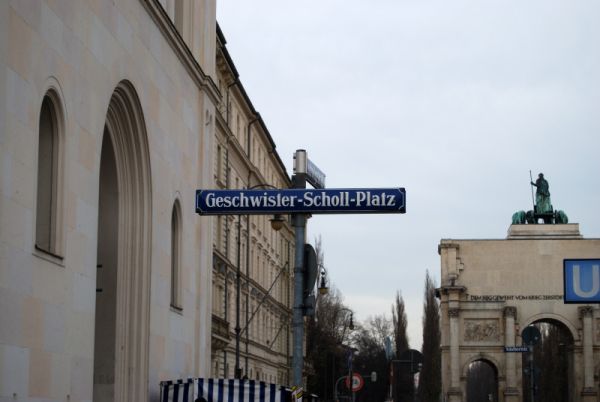The White Rose Conspiracy Failed
The White Rose Conspiracy Failed.
This article appeared in the February 12 edition of Die Welt, published in its "Geschichte," or History section. Translated, it means "Long live freedom!" The article recalls for Germans the conspiracy of students at the University of Munich during World War II, who secretly published anti-Nazi leaflets and scattered them everywhere—hundreds of leaflets. The photo on the left shows the conspirators; the photo on the right shows Judge Roland Freisler, who presided over the kangaroo-style Peoples' court that convicted the conspirators and sentenced them to death.
The conspiracy consisted of a brother and sister, Hans Scholl who studied medicine and Sophie who studied philosophy. Hans had served on the Russian Front with other fellow medical students, Willi Graf and Christoph Probst, and had witnessed atrocities committed by Army extermination-squads against Russian civilians and POWs. The three students returned to Germany after their tour ended, recruited other students, and committed themselves to overthrowing the Nazi regime.
White Rose leaflet, No. 3
Hans's sister Sophie saw copies of a White Rose leaflet at the University and remembered the line: "Der Staat ist niemals Zweck der Menschheit." In English: "Service to the government should never be the goal of people." In other words, it works better the other way around: the government should serve its people, help them to improve their lives, and to advance in society.
Later, she waited for Hans at his apartment to tell him about the leaflet, and saw a book lying on the kitchen table, a history by Friedrich Schiller. It had a bookmark in it. Without thinking, she opened the book and saw that Hans had underlined the same quote: "Der Staat ist niemals Zweck. . . ." Fear overtook her as she realized that Hans must have published the White Rose leaflet himself.
She knew Hans hung out with his friends at the studio of another student and went there to confront him. In fact, the group was already working on another leaflet. The members did not greet Sophie warmly, because the art of conspiracy means limiting knowledge of itself to a minimum, to prevent others from informing on it.
But Sophie insisted on joining and proved her mettle when she entered a government office to steal typewriter paper for printing more leaflets. When the group needed more postage stamps to send its leaflets to other cities, she bravely entered a post office and asked for a hundred first-class stamps. This took more courage than you might expect. The suspicious post-office clerk asked Sophie why she needed so many stamps? In a dictatorial society, you don't just walk into a post office and buy heaps of postage stamps. It doesn't pay to arouse suspicion.
Reading through the third White Rose leaflet, I just thought how quixotic can you get? These smart, cultured kids lined up against basically a hoodlum-culture. How in the world did they expect to get anywhere quoting ancient Greek authors and classical German philosophers—the architects of the new culture of republican government, that featured limited functions and individual initiative in a representative framework? The Nazis cared nothing for such things.
The White Rose Group represents education and culture in the best sense of the word, and they lost out to hoodlums who tortured them, then murdered them. Read this translation for a sense of what they believed:
- Political philosophies involve utopian forms; but a nation depends on a political culture that grows and ripens along with its people.
- The family provides the structure of a nation, which bases itself on the principle of justice and prosperity for all.
- A nation-state should feel obligated—whether in a Democracy or a Constitutional Republic— to protect the freedom of an individual, as part of a functioning, justice-bound political system, as much as it does the freedom of the whole.
- We have considered the different ways we could oppose the Nazis. Only one appeals to us: a passive resistance.
The White Rose Group presented Germans with the basic stance of a civilized society, but it failed, utterly, piteously. It failed because human-kind generally lacks the wherewithal to prevail against a dictatorial structure—one that controls the police, the military, and the government bureaucracies. Most people lack the educational background to understand the concepts that the White Rose Group tried to convey to them. So not only did the Group have the adversarial government to deal with, it had no sure way to convey adequately the constitutional options to the wider public.
Americans need to understand that their nation grows nearer to the political crisis that Germany had before the war—a society deeply divided politically, whose radical elements embrace violence and terrorism, more nihilistic in character than political. Neither radical side has enough self-respect, constitutional insight, or personal wisdom to govern. The lack of a philosophical basis leaves little room for problem-solving, except with violence and force. Their actions stem from a thirst for payback, rather than a concern with a mature political culture--rather like today's America.
The Geschwister-Scholl-Platz in Berlin, to commemorate Hans and Sophie Scholl




